What to know
- The House Jan. 6 committee late Thursday unveiled its formal eight-chapter report summarizing its investigation into the deadly attack on the Capitol.
- The report makes clear the committee's belief that "one man" — former President Donald Trump — was responsible for what happened on Jan. 6: a mob of his supporters who believed his stolen election lies violently attacked the Capitol in an attempt to stop the peaceful transfer of power.
- The committee provides more detail about a robust, organized campaign to assemble and deliver a bogus slate of electors — and identifies a less well-known Trump-allied lawyer as key to the plot, which the Justice Department is still investigating.
- The intel community escaped major criticism by Jan. 6 committee for missing "foreseeable" Capitol violence
Read the full report
The committee's final report is more 800 pages long.
A look at the missed warning signs, but no major criticism for intel community
WASHINGTON — The Jan. 6 committee report’s appendix on the intelligence and law enforcement failures ahead of the Jan. 6 attack highlights new information about missed warning signs but stops short of reaching any definitive conclusions or detailed recommendations about what experts have called the worst intelligence failure since Sept. 11.
The appendix includes some new information about just how much intelligence there was pointing to possible violence at and around the Capitol on Jan. 6 and just how poorly coordinated the FBI, the Department of Homeland Security, the military, U.S. Capitol Police and the Washington, D.C., government were in preparing for it.
The appendix also states what is widely known: There was a lot of information publicly available that suggested Jan. 6 would be violent, and law enforcement was not prepared for the violence it faced.
WH official said lawmakers could ignore vote to prevent socialism, report says
After the 2020 election, a White House official claimed that state legislators could “substitute their judgment for a certified majority of their constituents” in order to prevent socialism, the Jan. 6 committee report says.
Vince Haley, the deputy assistant to the president for policy, strategy and speechwriting, allegedly made the comments to Johnny McEntee, assistant to the president and the director of presidential personnel.
"Election fraud was ‘only one rationale for slating Trump electors,’ Haley told McEntee, and ‘[w]e should baldly assert’ that State legislators ‘have the constitutional right to substitute their judgment for a certified majority of their constituents’ if that prevents socialism," the committee report reads.
The report does not appear to list exactly what was written. A citation suggests it is from emails.
Haley also added that state capitals in Pennsylvania, Wisconsin and Michigan “do not have to sit idly by and submit themselves to rule by Beijing and Paris,” according to the report.
Claims that Democrats or President Joe Biden are socialists are popular on the political right. Contact information for Haley could not immediately be found late Thursday.
Chesebro — not Eastman — was the architect of the fake elector plot
While John Eastman has been singled out as the person who carved out novel and unusual legal theories that would have prevented Biden from becoming president, committee members said in the report that it was actually Kenneth Chesebro who was the architect of a fake elector plot that might have put Trump back in the White House.
“The fake elector plan emerged from a series of legal memoranda written by an outside legal advisor to the Trump campaign: Kenneth Chesebro. Although John Eastman would have a more prominent role in advising President Trump in the days immediately before January 6th, Chesebro … was central to the creation of the plan,” the report says.
The report summarized memos by Chesebro on Nov. 18, Dec. 9 and Dec. 13 that outlined a scheme by which slates of alternate electors in various swing states would gather to cast electoral votes, which “would preserve the Trump campaign’s options” because of the possibility of a subsequent “court decision (or, perhaps, a state legislative determination) … in favor of the Trump-Pence slate of electors.”
“Chesebro’s contemporaneous communications make clear that the goal was having Congress act on the fake electoral votes,” the report’s authors wrote.
Early proof that Trump was going to call on supporters to march on Capitol
As excitement grew inside the White House and among rally organizers for the Jan. 6 rally at the Ellipse, it grew more apparent that Trump was calling on supporters to march on the Capitol.
After Kimberly Guilfoyle texted with rally organizer Caroline Wren on Dec. 27 about the plans for the rally, “there was a series of calls among the senior White House staff, likely underscoring the seriousness of the White House’s interest in the event,” the report’s authors wrote.
“Within a few days, the White House began to take a more direct role in coordinating the rally at the Ellipse,” they wrote. During that stretch, organizers and White House staff members began to plan for a march to the Capitol by Trump supporters after his speech.
In a text to Wren on Dec. 29, Justin Caporale, a former Trump staffer who was asked to help produce the Ellipse rally, "wrote that after the president’s planned speech there ‘maybe [sic] a call to action to march to the [C]apitol and make noise,’” the report’s authors wrote.
“This is the earliest indication uncovered by the select committee that the president planned to call on his supporters to march on the U.S. Capitol,” the report stated. “But it wasn’t the last.”
The report then notes that on Jan. 2, rally organizer Katrina Pierson told Wren that Meadows had said that Trump was going to “call on everyone to march to the [C]apitol.”
Trump, campaign raised $250M based off stolen election, other messaging
Then-President Donald Trump and his campaign raised $250 million between the November 2020 election and Jan. 6, 2021, the Jan. 6 committee said.
The fundraising emails used incendiary — and false — language stating that the election was “rigged” or that donations could help stop people from “trying to steal the election,” according to the report. Most of the $250 million raised was from small-dollar donations, it says.
“Millions of dollars that were raised ostensibly for ‘election defense’ and ‘fighting voter fraud’ were not spent that way at all,” the report says.
Trump created a PAC, called Save America, that allowed him to keep millions and spend it with fewer restrictions, the committee wrote.
“Prior to the formation of Save America, any money raised by the Trump Campaign could effectively only be spent on recount and election-contest related expenses, and to pay off campaign debt,” the committee wrote. “But now the money raised into Save America could allow President Trump to pay for his personal expenses, such as travel or hotel stays.”
'I don’t know how they’re gonna retake the Capitol building back'
In a chilling exchange, the report describes how two Secret Service agents reacted to the mob at the Capitol in the minutes after Trump tweeted his video telling supporters to go home.
The report said that a minute after Trump's tweet went out, one agent told a group of agents that even more people had breached the Capitol. Another replied, "I don’t know how they’re gonna retake the Capitol building back at this point."
Various reports, testimony and documentary footage shot by House Speak Nancy Pelosi's daughter showed a long struggle to send National Guard troops in to help police quell the mob. It would be hours before backup arrived and the crowd eventually dispersed.
Jared Kushner began keeping close tabs on fundraising after Biden won: report
The committee alleges that Jared Kushner began closely monitoring the Trump campaign's effort to raise money off lies about the election on Nov. 8 — a day after NBC News and other networks called the 2020 race for Joe Biden.
The panel said it received documents confirming Kushner's involvement.
"Kushner requested that a daily tracker be created showing the Trump Campaign’s financial position from election day forward," the report said. "In an email, Kushner noted that the tracker would allow the Campaign to consider its cash flow ahead of the creation of “a new entity for POTUS[’s] other political activities.”
"Kushner stated that he needed this new daily tracker because the Trump Campaign was going to continue fundraising post-election," the report said.
The new entity was Trump’s new leadership PAC, Save America, which has paid tens of thousands of dollars per month to former Trump aides like Dan Scavino and Nick Luna; a fashion designer with ties to Melania Trump; Trump properties; and the America First Policy Institute, where Mark Meadows is a senior partner.
Trump wanted 10,000 National Guard members to protect him and supporters in march to Capitol, report says
Former President Donald Trump wanted 10,000 National Guard members protecting him and his supporters as they marched from the Ellipse to the U.S. Capitol, the report says.
Trump “floated” the idea after advisers tried to talk him out of being “on the ground” with supporters during the events of Jan. 6, citing concern for his safety, the report says. Trump wanted the National Guard to protect them from "any supposed threats by leftwing counter-protesters," according to the report.
A senior adviser, Max Miller, rejected the idea, saying it was unnecessary. In a text to former Trump campaign spokeswoman Katrina Pierson, he said, “Just glad we killed the national guard and a procession,” the report says.
Right-wing groups seemed to know Trump wanted an active role on Jan. 6
Lucas Denney, the leader of the right-wing militia group the Three Percenters, “curiously” had “heard a rumor” that Trump would march with protesters on Jan. 6, the report’s authors wrote.
“Things are going to be happening here. Trump is going to be speaking to everyone Wed [January 6] before everyone marches to the capital [sic]. Rumour [sic] has it that he may march with us,” Denney wrote in a Jan. 4 Facebook post, according to the report.
The committee adds: "On or about January 6th, Denney sent another message via Facebook, writing: 'Trump speaking to us around 11 am then we march to the capital and after that we have special plans that I can’t say right now over Facebook. But keep an eye out for live feed tomorrow from me. Tomorrow will be historic.'”
The report also cites a text message from Stop the Steal organizer Ali Alexander about plans to march to the Capitol after Trump's speech that was planned to take place at the Ellipse.
“On January 5th, Ali Alexander sent a text to a journalist saying: Ellipse then US capitol [sic]. Trump is supposed to order us to the capitol [sic] at the end of his speech but we will see,’” the report states.
Republican National Committee knew fundraising claims were false, report says
The Republican National Committee knew that then-President Donald Trump’s claims about the election were false but continued to raise money off them anyway, the Jan. 6 report said.
Trump and his campaign raised $250 million after the November 2020 presidential election with incendiary language about trying to “steal” the election, the report says.
The report also says that members of the RNC knew Trump’s claims about winning the election were false but that “they walked as close to the line as they dared” and made minor changes mainly to insulate it from legal exposure.
RNC lawyers instructed that messages shouldn’t say “steal the election” but were to use “try to steal the election" instead, the report says. Similar moves were made to rely on insinuation, it says, with phrases changed to such language as “Only LEGAL ballots must be counted and verified,” according to the report.
“RNC leadership knew that President Trump was lying to the American people. Yet, they did nothing to publicly distance themselves from his efforts to overturn the election,” the committee wrote. “The RNC’s response was merely to tinker around the edges of the fundraising copy.”
The report also says an RNC staffer in his 20s, Ethan Katz, was confused about the messaging.
Katz “rose to ask a question: How were staffers supposed to tell voters that the Trump Campaign wanted to keep counting votes in Arizona but stop counting votes in other States (like Pennsylvania, Georgia, and Michigan)?” the report reads.
Ivanka Trump grew visibly frustrated after failing to calm her father, committee says
The committee said Ivanka Trump grew visibly frustrated on Jan. 6 as she repeatedly tried to be a calming influence on her father, repeatedly encouraging him to tell his supporters to back down.
The committee says Ivanka Trump told them that she eventually retreated to the office of her husband, Jared Kushner, "because she needed to 'regroup' and collect herself."
Several witnesses backed her account, describing her as appearing "[v]isibly upset" after having spoken with her father, as though she had just had a "tough conversation," according to the committee.
The committee's recommendations for Congress, agencies
As it was tasked to do, the committee issued a number of recommendations in its report to both Congress and federal agencies. It called for reforms to the Electoral Count Act of 1887 to make it clear that the vice president does not have the authority to unilaterally reject electoral votes, an update that is already in the works. Congress will pass such a recommendation this week as part of its omnibus spending package.
The panel also urged congressional committees to examine whether to create a “formal mechanism” to evaluate whether to bar Trump and others identified in the report from holding future office under the 14th Amendment.
In addition, the Jan. 6 committee recommended that federal agencies undertake a “whole of government strategy” to root out and combat violent extremism, including white nationalists. And it urged law enforcement to designate future certifications of presidential elections as a “national special security event.” That would require greater planning, coordination and security for future Jan. 6 certification events at the Capitol.
Trump was 'looped in' on Eastman's theory about vice president's role from the start, report says
Lawyer John Eastman reached out to then-President Donald Trump the day he began drafting a memo arguing that the vice president could overturn the 2020 election results — and heard back immediately, according to the report.
On Dec. 23, 2020, in an email to Trump’s assistant, Molly Michael, Eastman said: “Is the President available for a very quick call today at some point? Just want to update him on our overall strategic thinking.”
Five minutes later, Eastman got a phone call from the White House switchboard, the report says. The conversation lasted 23 minutes.
The two-page memo Eastman drafted Dec. 23 was the first of two, and it summarized a way to ensure that “President Trump is re-elected,” the report says, adding, "From the start, President Trump was looped in on Eastman’s proposal."
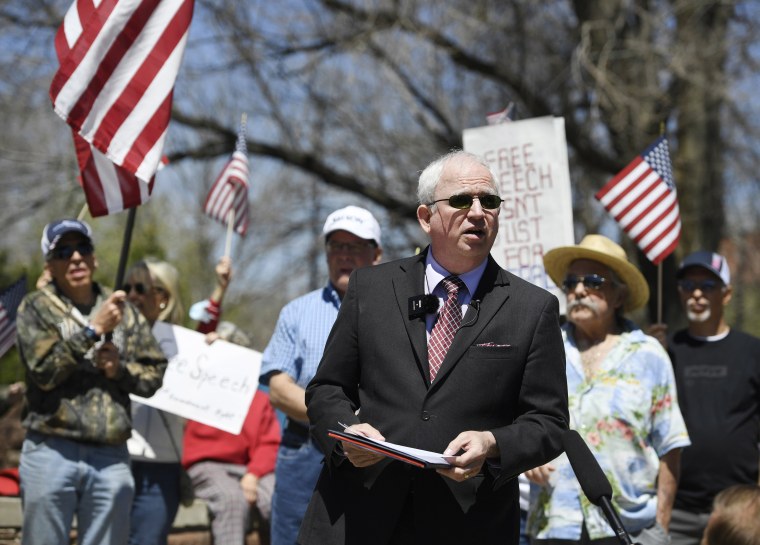
Committee says Giuliani 'frantically called' Trump and GOP lawmakers on Jan. 6
Although the committee had previously said Rudy Giuliani spoke to both the president and a group of Republican lawmakers Jan. 6, the report reveals just how close to each other those calls occurred.
The committee says Giuliani "frantically called" the White House as soon as Trump posted a video on Twitter urging supporters to go home (hours after the riot began). "Failing to get through he called back, once every minute, 4:17 p.m., 4:18 p.m., 4:19 p.m., 4:20 p.m.," the report said. At 4:21, the report said, Giuliani eventually reached chief of staff Mark Meadows and then, finally, after several more calls to the White House, Trump.
According to the committee, after Giuliani and Trump spoke for around 12 minutes, Giuliani called a group of GOP lawmakers — some of whom he connected with.
Then, at 8:39 p.m., Trump and Giuliani spoke again for around nine minutes.
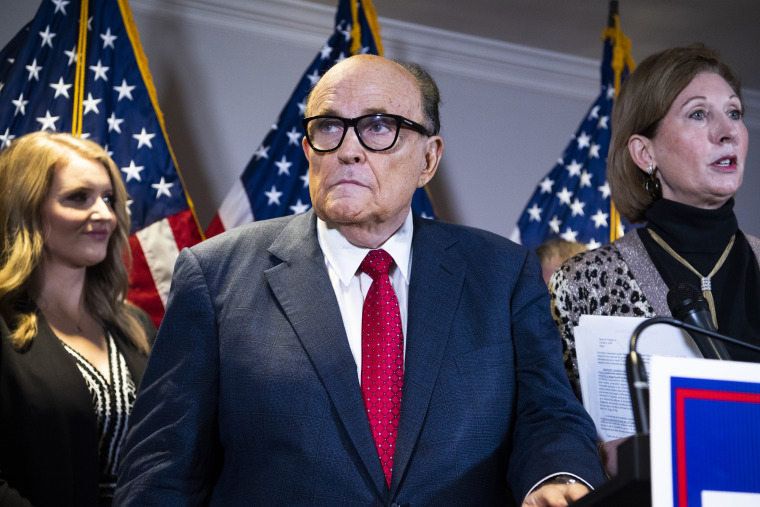
Secret Service 'informed of potential violence' on Jan. 6
The Secret Service knew violence was possible at the Jan. 6 rally, the report concluded.
“The Committee has reviewed hundreds of thousands of new Secret Service documents, including many demonstrating that the Secret Service had been informed of potential violence at the Capitol before the Ellipse rally on January 6th,” its authors wrote. “These documents were critical to our understanding of what the Secret Service and White House knew about the threat to the Capitol on January 6th.”
The committee previously disclosed that the Secret Service knew of threats of violence by Trump supporters at the Jan. 6 rally but didn't warn Capitol Police about them until Jan. 5.
Trump or circle made ‘at least 200’ attempts to pressure lawmakers, officials
Then-President Donald Trump and his inner circle made at least 200 attempts to pressure lawmakers or other officials to overturn state electors, the Jan. 6 committee report says.
There were 68 meetings, phone calls or texts aimed at state or local officials; 18 public remarks targeting them; and 125 social media posts, the committee says.
Trump’s campaign tried to contact almost 200 lawmakers about overturning results, and some of the messages read “on behalf of the president,” the report says. Around 300 lawmakers from battleground states also reportedly participated in a Jan. 2 briefing with Trump, it says.
Perhaps the most famous of Trump’s efforts to pressure local officials was his call to Georgia Secretary of State Brad Raffensperger, in which he said, “I just want to find 11,780 votes.”
Trump tried to speak with Raffensperger by phone 18 times, the report says.
Raffensperger had avoided taking his calls, but they spoke on Jan. 2, 2021, it says.
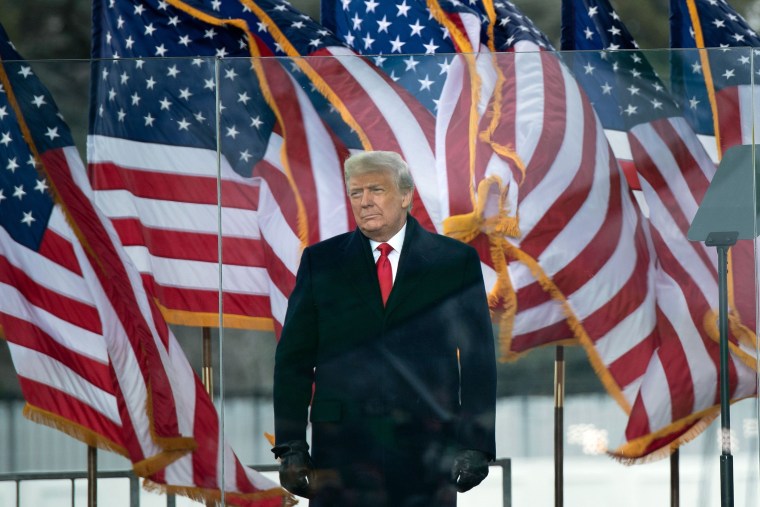
A Trump campaign operative's 'major' role in the slate of fake electors
The Jan. 6 committee revealed more details about what it says was a robust, organized effort to assemble and deliver a bogus slate of electors to then-Vice President Mike Pence ahead of Jan. 6.
The committee said a little-known Trump campaign operative named Michael Roman was "tapped for a major operational role in the fake elector effort" led by Trump-aligned lawyers Kenneth Chesebro and Rudy Giuliani. According to the report, Roman was tapped to lead an "Electors Whip Operation" to shore up fake electors for the list the committee previously said the Trump campaign would try to deliver to Pence.
Politico previously reported that Roman was the one to ultimately deliver the false slates to Capitol Hill, although the documents never reached Pence himself.
The so-called fake elector plot is a key part of the Justice Department's Jan. 6 investigation.
William Barr said Trump replaced staff with ‘clown car’ after loss
Former Attorney General William Barr referred to staff members President Donald Trump brought on after the November election as the “clown car,” the Jan. 6 committee report released Thursday says.
The committee wrote that Trump’s campaign team had told him that he had lost the 2020 presidential election and that there was no evidence of significant fraud.
“When his campaign staff wouldn’t tell him what he wanted to hear, President Trump replaced them with what Barr described as a ‘clown car’ of individuals willing to promote various conspiracy theories,” the committee wrote in the report.
The report also says that Trump was told there was no evidence of fraud that would have changed the result of the election and that he ignored the fact.
The committee wrote: “President Trump’s decision to declare victory falsely on election night and, unlawfully, to call for the vote counting to stop, was not a spontaneous decision. It was premeditated.”
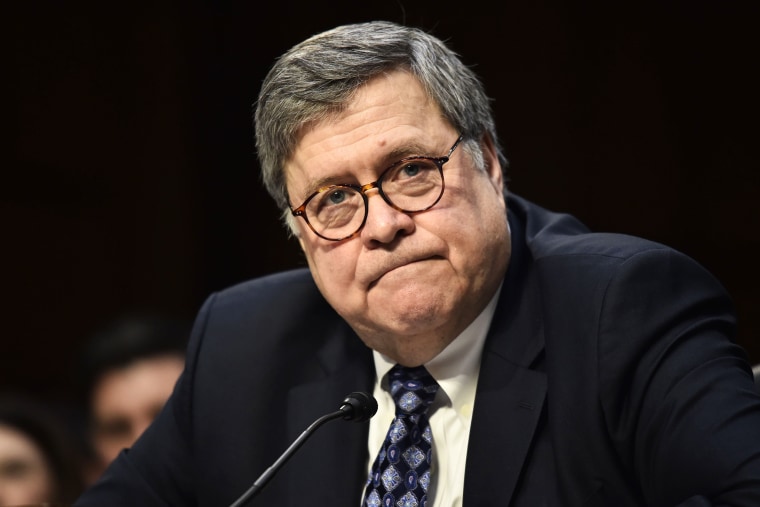
Ali Alexander said he believed White House wanted him to lead rallygoers to Capitol
"Stop the Steal" organizer Ali Alexander believed the White House wanted him to lead attendees of Trump's Jan. 6 rally to the Capitol, the report said.
The report suggests he got the idea from Caroline Wren, a top Trump campaign fundraiser who was involved in planning the rally at the Ellipse. Alex Jones, who has claimed the White House told him to lead the march, texted Wren at 12:27 p.m. ET that day and asked when he should begin the march, the committee said.
The committee also said Wren thought top Trump allies Michael Flynn and Roger Stone would join the march, but neither did. According to the report, Wren asked Flynn whether he was joining, and he told her, "Hello no, it's freezing."
Alex Jones texted with Enrique Tarrio during the attack
Prominent members of the Proud Boys were in touch with Infowars host Alex Jones during the Jan. 6 attack and in the days following it, the report said.
Enrique Tarrio, the Proud Boys leader who was indicted on seditious conspiracy charges related to attack, texted with Jones three times and Jones’ Infowars co-host, Owen Shroyer, five times during the Jan. 6 riots, according to records from Tarrio’s phone, the report said.
Another Proud Boys leader, Ethan Nordean, exchanged 23 texts with Shroyer on Jan. 4 and Jan. 5, Nordean’s phone records showed. The two also spoke by phone both days.
The information reveals a previously unknown level of communication among Jones, Shroyer and prominent members of the Proud Boys.
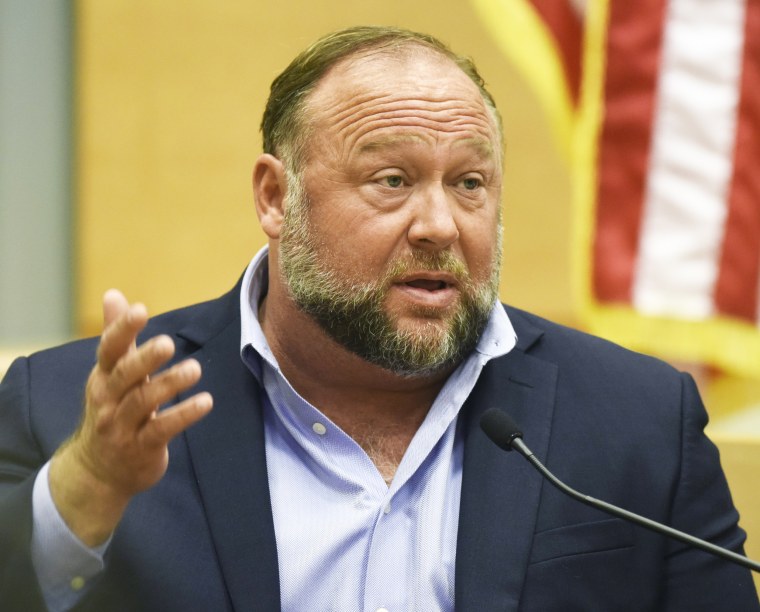
Jan. 6 committee report gives William Barr a redemption arc
Former Attorney General William Barr and the Justice Department were publicly silent for weeks after the 2020 election as Donald Trump spread lies about fraudulent results. It wasn't until December that Barr finally publicly acknowledged reality: that there was no evidence of mass fraud.
But in the Jan. 6 committee report, Barr is held out as somewhat of a hero. The report states that Barr and the Justice Department were "forced to knock down one lie after another" and that the Justice Department was "trying to contain the president’s conspiracy-mongering." While Barr privately pushed back against the Trump's conspiracy theories, the Justice Department refused for weeks to publicly acknowledge that there was no evidence of mass voter fraud, as Trump claimed again and again.
Jan. 6 committee unveils final report, capping 18-month probe
The House Jan. 6 committee on Thursday unveiled its formal report on its historic 18-month investigation into the deadly attack on the Capitol and former President Donald Trump’s efforts to overturn the 2020 election. The more-than-800-page report comes days after a final committee meeting at which its members — seven Democrats and two Republicans — voted to recommend that the Justice Department pursue criminal charges against Trump as he makes another bid for the White House in 2024.
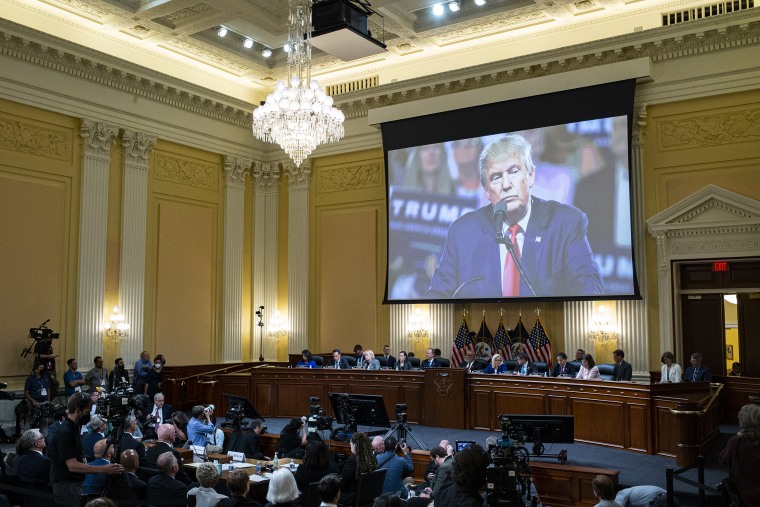
'What are you doing? Like, this is indefensible.'
Former White House press official Sarah Matthews recalled having a crisis of conscience on Jan. 6, when she found herself — in an off-the-record discussion with a journalist — trying to defend Trump's declaration that the Jan. 6 rioters were "very special."
Trump told Jan. 6 demonstrators at the Capitol in a Twitter video that he loved them but that they should go home.
"I can recall texting some reporters back, especially after the video," she said in a transcript of her testimony. "And I remember a specific reporter asking me about that line and trying to defend it off the record. And I was just — I remember thinking to myself: 'What are you doing? Like, this is indefensible.'"
Matthews decided to resign shortly thereafter and called the video a final straw.
"I think when that video was tweeted out, that was kind of the breaking point for me, because it felt, in my role as a spokesperson, indefensible," she said.
Cassidy Hutchinson knew she was going to be ‘nuked’ for turning on Trump. She did it anyway.
Cassidy Hutchinson sped out of Washington in the wee hours of the morning while Googling “Watergate” on her phone, frantically looking for some kind of guidance about how to be a whistleblower.
Until that moment, Cassidy, the former Donald Trump White House aide who would go on to be the star witness before the House committee investigating the Jan. 6 insurrection, had remained “loyal” and “in the family,” as Trumpworld insiders kept reminding her, according to transcripts of her testimony released Thursday.
She didn’t even know who was paying her own lawyer, but he made it clear that her job was to “protect the president.” And he kept dangling job opportunities and promising she would be “taken care of” if she did her part, she ultimately told the committee.
But the night before she fled for her parents’ house in New Jersey, Hutchinson said, she “had a mental breakdown” as the moral crisis she had been grappling with came to a head, pushing her to make a decision that would change the course of the investigation into the 2021 attack on the Capitol. Never-before-seen transcripts of her interviews with investigators released Thursday offer a fresh portrait of a young, desperate woman torn between her conscience and some of the most powerful men in America.
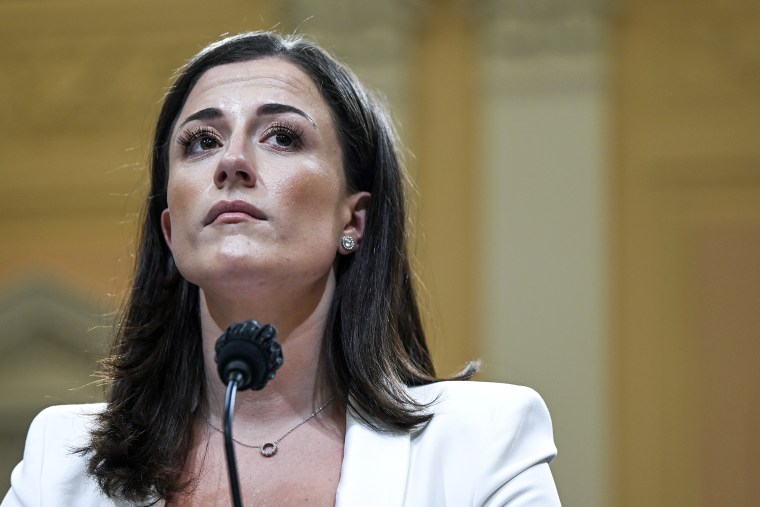
Hutchinson's former lawyer pushes back against her allegations
Former deputy White House counsel Stefan Passantino defended himself against allegations by Cassidy Hutchinson in testimony released Thursday by the House Jan. 6 committee.
In a statement, Passantino insisted he had been ethical in his former representation of Hutchinson, who drew national attention when she delivered bombshell testimony at a public hearing for the Jan. 6 panel in June.
“As with all my clients during my 30 years of practice, I represented Ms. Hutchinson honorably, ethically, and fully consistent with her sole interests as she communicated them to me," Passantino said. "I believed Ms. Hutchinson was being truthful and cooperative with the committee throughout the several interview sessions in which I represented her. It is not uncommon for clients to change lawyers because their interests or strategies change. It is also not uncommon for a third-party, including a political committee, to cover a client’s fees at the client’s request. External communications made on Ms. Hutchinson’s behalf while I was her counsel were made with her express authorization. "
Hutchinson said Passantino instructed her to limit the information she shared with the Jan. 6 committee after she recounted the story to him about an incident in Trump's vehicle during the riot that reflected unfavorably on the former president. She also said Passantino dangled job prospects to keep her “in the family.”
In his statement, Passantino said that the panel failed to reach out to him to "get the facts" and that he would take a leave of absence from the law firm Michael Best & Friedrich LLP while he continues as a partner at the political law firm Elections LLC, which, according to his LinkedIn page, he founded in 2019.
Panel releases 5 more transcripts of witness testimony
The House Jan. 6 committee released five more transcripts of its closed-door interviews with witnesses.
They include interviews with Chris Krebs, the former director of the Cybersecurity and Infrastructure Security Agency; former Trump supporter and Jan. 6 defendant Stephen Ayres (in two parts); former Defense Secretary Mark Esper; former Justice Department official Ken Klukowski; and former Trump White House deputy press secretary Sarah Matthews.
The committee, which had vowed to make transcripts of material gathered throughout its investigation publicly available, on Wednesday evening released 34 transcripts of witness testimony, which can now be found on its website.
The most recent transcript release comes after the committee earlier in the day made records from former White House aide Cassidy Hutchinson's bombshell testimony public.
Trump's tax returns also likely to be released this week
The House Ways and Means Committee voted Tuesday to make six years of former President Donald Trump’s tax returns public — potentially ending years of speculation about what they might reveal about his business dealings and personal wealth.
The panel voted along party lines to make the returns available. The information was expected to be available as soon as Thursday — the day the House Jan. 6 committee is set to issue its final report on the riot. But committee chair Richard Neal, D-Mass., said late Thursday that staffers were still redacting sensitive personal information from the returns and that they most likely wouldn't be ready for the "next couple of days."
Rep. Brendan Boyle, D-Pa., said Tuesday the redactions would take some time.
“The actual returns themselves will also be transmitted to the full House and become public, but I was told it will take a few days to a week in order to redact some info that needs to be redacted,” Boyle said.
Senate passes $1.7 trillion government funding bill that would overhaul U.S. election law
The Senate voted Thursday to pass a $1.7 trillion government funding bill, sending it to the House to avoid a holiday shutdown.
The vote was 68-29 on sweeping legislation that would keep the government funded through next fall and overhaul election laws to prevent another Jan. 6.
The legislation includes a rewrite of an 1887 federal election law to close loopholes that then-President Donald Trump and his team sought to exploit on Jan. 6, 2021, to make it harder for presidential candidates to steal elections. It would also grant extra funds to the Justice Department for Jan. 6 prosecutions.
Senate Majority Leader Chuck Schumer, D-N.Y., said the election measures in the bill would “preserve our democracy for generations to come.”
Summary highlights: Trump was 'central cause' of Jan. 6, committee says
The House Jan. 6 select committee released an executive summary of its full report Monday, focused mainly on former President Donald Trump.
The reams of evidence the committee gathered and presented over months of investigation "has led to an overriding and straight-forward conclusion: the central cause of January 6th was one man, former President Donald Trump, who many others followed."
"None of the events of January 6th would have happened without him."
But the summary also highlighted the committee's belief that numerous figures close to Trump were being less than candid in their testimony, through either evasions or claims that they couldn’t remember the answers to questions. In some cases, the committee said, the purported memory lapses were not credible and appeared to be attempts to conceal information.
Hutchinson, Cheney discuss whether story about Trump in SUV constituted 'water cooler chatter'
In an exchange with Cheney during her testimony, Hutchinson said that she’d been reluctant to describe a notorious incident of Trump’s behavior in an SUV on Jan. 6 as “water cooler chatter” because there were, in fact, no water coolers in the West Wing — and that if she’d described it as such, critics might allege she was being untruthful.
“I feel like if I say ‘water cooler chatter,’ there’s going to be somebody that will come out and criticize me and say that there was, there were no water coolers in the West Wing, so I don’t know what I’m talking about,” Hutchinson said.
“But, generally speaking, yes, that is what I would categorize it,” Hutchinson said.
Hutchinson had testified about the incident over the summer, when she described having heard that Trump had tried to grab the steering wheel of his presidential vehicle and lunged toward his security detail when he was informed he would not be taken to the Capitol after his Jan. 6 rally.
'It could be worse ... the president could have tried to strangle you on Jan. 6,' ex-Trump deputy chief of staff said, according to Hutchinson
Hutchinson said she recalled Tony Ornato, former deputy White House chief of staff under Trump, making “sarcastic offhand remarks” during a call in which they discussed whether they could have done more to stop the events of Jan. 6.
Right before he hung up, Ornato said “something to the effect of well, ‘All right, well, chin up, kid. Let’s talk soon. It could be worse, the president could have tried to kill’ — he didn’t say kill — ‘the president could have tried to strangle you on Jan. 6,’” Hutchinson said.
Hutchinson said she laughed in response: “That’s true. At least he didn’t try and do that."
Hutchinson previously testified during a public hearing that Ornato told her Trump became angry when his Secret Service detail refused to take him to the Capitol as his supporters descended on the building.
Hutchinson recalled Meadows acknowledging that Biden would be sworn in as president
Hutchinson, in her testimony, recalled how Meadows had made it clear to Secret Service agents at a White House holiday reception that there was going to be a transition of power and that he had wished them well in the Biden administration.
“I’ve really enjoyed working with you all, and I’m sure that you’re going to do great in the incoming Biden administration,” Hutchinson recalled Meadows, who’d played a central role in advancing Trump’s false claims about the 2020 election, telling the agents.
“In my mind that was an indication that Mr. Meadows knew that he was not going to be — that Mr. Trump was not going to be the president after January 20th,” she continued.
Hutchinson on parting ways with Trump-tied lawyer: 'I was not going to let this moment completely destroy my reputation'
Hutchinson described her thought process when she decided to let go of Stefan Passantino as her legal counsel.
She acknowledged that she took the former Trump White House lawyer's “bad legal advice” before coming to the realization that “my character and my integrity mean more to me than anything.”
Hutchinson said she felt Passantino had steered her in “the wrong direction” and she needed to “course correct” herself.
“Because my lawyer, I knew wasn’t going to help me — it was clear for a long time that he was not representing my interests in how he knew I wanted to facilitate my relationship with the committee,” she said. “But I was not going to let this moment completely destroy my reputation, my character, and my integrity for a cause that I was starkly opposed to.”
Hutchinson recalls being inspired to testify by Nixon aide Butterfield, who revealed secret White House tapes
At another point in her testimony, Hutchinson recalled how she was moved by the experience of Alex Butterfield — an assistant to Nixon who revealed the White House’s internal taping system in 1973 during the Watergate investigation but was not otherwise involved in the misconduct — to eventually come forward with what she knew of Trump.
Hutchinson recalled how during a drive to New Jersey she began wondering whether any aide in the Richard Nixon administration had held a position similar to her own during the Watergate scandal. She explained how, during an internet deep dive, she came across Butterfield’s name and ordered two copies of a book the former aide had written with journalist Bob Woodward.
“It was after I read all of this, where he had talked about, like, how he fought the moral struggle, where he felt like he still had to be loyal to the Nixon White House, but he talked about a lot of the same things that I felt like I was experiencing,” she testified. “It wasn’t an identical situation, but it’s — it’s the emphasis he placed on the moral questions that he was asking himself resonated with me.”
“He ended up testifying to the Watergate committee,” she continued. “He was somebody that I found and that I was looking at as somebody who did know things and who was loyal and who had a position that required an incredible amount of trust and confidence, but he ended up doing the right thing.”
Pelosi thanks Jan. 6 committee in final press conference as speaker
House Speaker Nancy Pelosi, D-Calif., gave her last press conference as the House Democratic leader on Thursday. In remarks, she thanked the Jan. 6 Committee for its work ahead of the final report's release.
"The 117th Congress began with a violent assault on our democracy, and now we hear its conclusions," she said. "We have a vital roadmap ensuring justice will be done and keep, and that this won't happen again."
Hutchinson detailed difficulties with paying for attorney not funded by Trump allies
Hutchinson described obstacles she faced in trying to find the funding needed to secure new legal counsel that was not funded by allies of Trump.
She recalled speaking with her aunt and uncle, whom she “had not spoken with in years because they are QAnon fans,” about the matter. They looked to refinance their house “to free up money so I could not have to go back to Trump world,” she said.
Hutchinson said that she also turned to her biological father, whom she doesn’t have a relationship with. She said she drove to his house in New Jersey one night to beg him, which ultimately became “probably one thing I regret in all of this” after he refused.
“I remember saying to him, ‘You have no idea what they’re going to do to me if I have to get an attorney with Trump world,’ because he’s a very big Trump supporter, as is his own right, and I don’t — it’s not me being critical. It’s just a fact,” Hutchinson said.
“And he just didn’t get it. And I didn’t expect him to. But I just left there feeling defeated,” she continued.
'The less you remember the better': Hutchinson says lawyers urged her not to share key details with committee
Former Trump White House aide Cassidy Hutchinson told the Jan. 6 committee in a September interview that her former lawyer urged her not to share key details about Jan. 6th with the committee.
Hutchinson, who delivered bombshell testimony to the Jan. 6 committee this summer, had previously been represented by Stefan Passantino, who had also worked as a lawyer in the Trump White House. In her June testimony, Hutchinson said she was told by another former Trump aide that the then-president tried to grab the steering wheel of his presidential vehicle after he was told he couldn't join supporters at the Capitol on Jan. 6.
She said that when she recounted the story to Passantino, he told her, "No, no, no, no, no. We don't want to go there. We don't want to talk about that." She asked what she could share, and he advised, "Keep your answers short, sweet, and simple, seven words or less. The less the committee thinks you know, the better, the quicker it's going to go. It's going to be painless, and then you're going to be taken care of."
She also recalled discussing with Passantino plans to have Trump join the march to the Capitol. She said told her, "The less you remember the better."
Hutchinson also told the committee she felt pressured by other various Trump allies about her testimony.
'They will ruin my life, mom': Cassidy Hutchinson expressed concerns when Trump allies got involved in her legal defense
In her deposition, Cassidy Hutchinson, former aide to then-White House chief of staff Mark Meadows, recalled telling her mother that she was becoming increasingly concerned after Stefan Passantino, who has strong ties to the former president, began serving as her legal counsel.
"She knew I was looking for attorneys, and she asked me, like, 'Aren’t you really happy? Like, this is great. I’m so happy that, like, they connected you with someone,'" Hutchinson said.
Hutchinson said she remembers responding with "snarly laughing" that she actually thought that was a negative for her.
Hutchinson said she explained that she was “completely indebted to these people" and that "they will ruin my life, Mom, if I do anything that they don’t want me to do.”
Hutchinson ultimately parted ways with Passantino, and appointed Jody Hunt as her new lawyer. Hunt is a longtime ally of Jeff Sessions, who was Trump's first attorney general and drew his ire when he recused himself from the Russia probe.
Committee releases Cassidy Hutchinson transcripts
The committee released more transcripts on Thursday, making public the closed-door interviews with White House aide Cassidy Hutchinson.
Committee releases transcripts of testimony from witnesses who largely plead the 5th
The House Jan. 6 Committee released 34 transcripts of witness testimony Wednesday evening, most of whom invoked their Fifth Amendment rights to avoid answering questions throughout their testimony.
Some highlights of key witness transcripts:
- Roger Stone, former Trump campaign aide: Stone pleaded the Fifth throughout his deposition, including questions about his age, place of residence and if he had a role in planning the violence at the Capitol on Jan. 6.
- Charlie Kirk, far-right media figure who founded the pro-Trump Turning Point USA: Kirk pleaded the Fifth to every question (including his age) other than what state he lives in (Arizona.)
- Nick Fuentes, white nationalist political commentator: Fuentes answered several biographical questions such as his place of residence and whether he worked for the government, but was advised by his lawyer to start pleading the Fifth when asked if he was currently employed.
- Alex Jones, InfoWars host: Jones' testimony began with him saying that he’s so stressed out that he can’t spell his middle name. He pleaded the Fifth to nearly every question. He also briefly accused Jan. 6 committee member Rep. Adam Schiff, D-Calif., of forging documents, saying he wants to “tell you guys everything, but I don’t trust Congressman Schiff.”
- Michael Flynn, former Trump national security adviser: Flynn answered some biographical questions before pleading the Fifth throughout his testimony. He declined to say whether he had a role in Trump’s efforts to overturn the election results.
Read the full text of the Jan. 6 committee’s report summary
The Jan. 6 committee on Monday released a 154-page summary of its findings, the culmination of nearly 18 months of work.
















